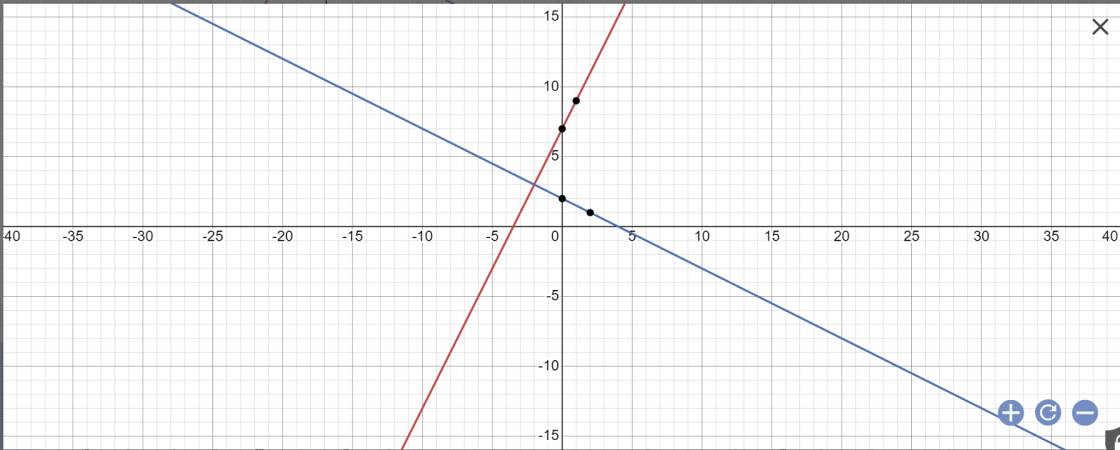Hãy nhập câu hỏi của bạn vào đây, nếu là tài khoản VIP, bạn sẽ được ưu tiên trả lời.

a, Từ giả thiết suy ra \(\left\{{}\begin{matrix}a+b=-2\\-2a+b=3\end{matrix}\right.\Rightarrow\left\{{}\begin{matrix}a=-\dfrac{5}{3}\\b=-\dfrac{1}{3}\end{matrix}\right.\Rightarrow y=-\dfrac{5}{3}x-\dfrac{1}{3}\)
b,
c, Phương trình hoành độ giao điểm
\(-\dfrac{5}{3}x-\dfrac{1}{3}=x-3\Leftrightarrow x=1\Rightarrow y=-2\Rightarrow M\left(1;-2\right)\)
d1, \(tanMPQ=-\left(-\dfrac{5}{3}\right)=\dfrac{5}{3}\Rightarrow\widehat{MPQ}\approx59^o\)
d2, \(P\left(-\dfrac{1}{5};0\right);Q\left(3;0\right);M\left(1;-2\right)\)
Chu vi \(P=PQ+QM+MP=\dfrac{16}{5}+2\sqrt{2}+\dfrac{2\sqrt{34}}{5}\)
\(p=\dfrac{\dfrac{16}{5}+2\sqrt{2}+\dfrac{2\sqrt{34}}{5}}{2}\)
Diện tích \(S=\sqrt{p\left(p-\dfrac{16}{5}\right)\left(p-2\sqrt{2}\right)\left(p-\dfrac{2\sqrt{34}}{5}\right)}=...\)

\(\dfrac{1}{2}x^2-\left(-2+1\right)x+\dfrac{-2-1}{2}=0\)
\(\Rightarrow\dfrac{1}{2}x^2+x-\dfrac{3}{2}=0\)
Tới đây dùng \(\Delta\) chứ, nếu bn lấy \(\dfrac{1}{2}\) đặt lm nhân tử chung thì ở đây hơi vô lí

1.
Đồ thị hàm số:
2.
Phương trình hoành độ giao điểm:
\(\dfrac{x^2}{4}=\dfrac{-x}{2}+2\)
\(\Leftrightarrow\dfrac{x^2}{4}+\dfrac{x}{2}-2=0\)
\(\Leftrightarrow\left[{}\begin{matrix}x=2\\x=-4\end{matrix}\right.\)
\(x=2\Rightarrow y=1\Rightarrow\left(2;1\right)\)
\(x=-4\Rightarrow y=4\Rightarrow\left(-4;4\right)\)
3.
Phương trình tiếp tuyến của \(\left(P\right)\) có dạng \(y=ax+b\left(d'\right)\)
Vì \(\left(d'\right)//\left(d\right)\Rightarrow-\dfrac{1}{2}=a;b\ne2\Rightarrow y=-\dfrac{1}{2}x+b\left(d'\right)\)
Phương trình hoành độ giao điểm của \(\left(d\right);\left(P\right)\)
\(-\dfrac{1}{2}x+b=\dfrac{x^2}{4}\Leftrightarrow\dfrac{1}{4}x^2+\dfrac{1}{2}x-b=0\left(1\right)\)
\(\Delta'=\dfrac{1}{4}+b=0\Leftrightarrow b=-\dfrac{1}{4}\)
\(\Rightarrow y=-\dfrac{1}{2}x-\dfrac{1}{4}\left(d'\right)\)
\(\left(1\right)\Leftrightarrow\dfrac{1}{4}x^2+\dfrac{1}{2}x+\dfrac{1}{4}=0\Leftrightarrow x=-1\Rightarrow y=\dfrac{1}{4}\)
\(\Rightarrow\left(-1;\dfrac{1}{4}\right)\)

Bạn tự vẽ nhé.
\(a,\) 2 đồ thị hàm số \(y=2x,y=-3x+5\) giao nhau khi và chỉ khi :
\(2x=-3x+5\\ \Leftrightarrow5x=5\\ \Leftrightarrow x=1\)
Thay \(x=1\) vào \(y=2x\Leftrightarrow y=2\)
Vậy giao điểm của 2 đồ thị là \(\left(1;2\right)\)
\(b,\) 2 đồ thị hàm số \(y=3x+2,y=-\dfrac{1}{2}x+1\) giao nhau khi và chỉ khi :
\(3x+2=-\dfrac{1}{2}x+1\\ \Leftrightarrow\dfrac{7}{2}x=-1\\ \Leftrightarrow x=-\dfrac{2}{7}\)
Thay \(x=-\dfrac{2}{7}\) vào \(y=3x+2\Rightarrow y=\dfrac{8}{7}\)
Vậy giao điểm của 2 đồ thị là \(\left(-\dfrac{2}{7};\dfrac{8}{7}\right)\)
\(c,\) 2 đồ thị hàm số \(y=\dfrac{3}{2}x-2,y=-\dfrac{1}{2}x+2\) giao nhau khi và chỉ khi :
\(\dfrac{3}{2}x-2=-\dfrac{1}{2}x+2\\ \Leftrightarrow2x=4\\ \Leftrightarrow x=2\)
Thay \(x=2\) vào \(y=\dfrac{3}{2}x-2\Rightarrow y=1\)
Vậy giao điểm của 2 đồ thị là \(\left(2;1\right)\)
\(d,\) 2 đồ thị hàm số \(y=-2x+5,y=x+2\) giao nhau khi và chỉ khi :
\(-2x+5=x+2\\ \Leftrightarrow-3x=-3\\ \Leftrightarrow x=1\)
Thay \(x=1\) vào \(y=x+2\Rightarrow y=3\)
Vậy giao điểm của 2 đồ thị là \(\left(1;3\right)\)

a: 
b: Phương trình hoành độ giao điểm là:
\(2x+7=-\dfrac{1}{2}x+2\)
=>\(2x+\dfrac{1}{2}x=2-7=-5\)
=>2,5x=-5
=>x=-2
Thay x=-2 vào y=2x+7, ta được:
\(y=2\cdot\left(-2\right)+7=7-4=3\)
Vậy: A(-2;3)
c: Tọa độ B là:
\(\left\{{}\begin{matrix}y=0\\2x+7=0\end{matrix}\right.\Leftrightarrow\left\{{}\begin{matrix}y=0\\2x=-7\end{matrix}\right.\)
=>\(\left\{{}\begin{matrix}y=0\\x=-3,5\end{matrix}\right.\)
Tọa độ C là:
\(\left\{{}\begin{matrix}y=0\\-\dfrac{1}{2}x+2=0\end{matrix}\right.\Leftrightarrow\left\{{}\begin{matrix}y=0\\-\dfrac{1}{2}x=-2\end{matrix}\right.\Leftrightarrow\left\{{}\begin{matrix}y=0\\x=4\end{matrix}\right.\)
Vậy: C(4;0)
A(-2;3); B(-3,5;0); C(4;0)
\(AB=\sqrt{\left(-3,5+2\right)^2+\left(0-3\right)^2}=\dfrac{3\sqrt{5}}{2}\)
\(AC=\sqrt{\left(4+2\right)^2+\left(0-3\right)^2}=3\sqrt{5}\)
\(BC=\sqrt{\left(4+3,5\right)^2+\left(0-0\right)^2}=7,5\)
Vì \(AB^2+AC^2=BC^2\)
nên ΔABC vuông tại A
=>\(\widehat{BAC}=90^0\)
Xét ΔABC vuông tại A có \(sinABC=\dfrac{AC}{BC}=\dfrac{3\sqrt{5}}{7,5}\)
=>\(\widehat{ABC}\simeq63^0\)
ΔABC vuông tại A
=>\(\widehat{ABC}+\widehat{ACB}=90^0\)
=>\(\widehat{ACB}=90^0-63^0=27^0\)
d: Chu vi tam giác ABC là:
\(C_{ABC}=AB+AC+BC=\dfrac{3\sqrt{5}}{2}+3\sqrt{5}+7,5=\dfrac{9\sqrt{5}+15}{2}\)
Diện tích tam giác ABC là:
\(S_{ABC}=\dfrac{1}{2}\cdot AB\cdot AC=\dfrac{1}{2}\cdot\dfrac{3\sqrt{5}}{2}\cdot3\sqrt{5}=\dfrac{45}{4}\)
Lời giải:
PT hoành độ giao điểm:
$\frac{x^2}{4}=2x-1$
$\Leftrightarrow x^2=8x-4$
$\Leftrightarrow x^2-8x+4=0$
$\Leftrightarrow x=4\pm 2\sqrt{3}$
Với $x=4+2\sqrt{3}$ thì $y=2x-1=7+4\sqrt{3}$. Giao điểm thứ nhất $(4+2\sqrt{3}, 7+4\sqrt{3})$
Với $x=4-2\sqrt{3}$ thì $y=2x-1=7-4\sqrt{3}$. Giao điểm thứ hai $(4-2\sqrt{3}, 7-4\sqrt{3})$
Ta giải hệ phương trình sau: \(\left\{{}\begin{matrix}y=\dfrac{x^2}{4}\\y=2x-1\end{matrix}\right.\)
Từ hệ phương trình trên, ta có: \(\dfrac{x^2}{4}=2x-1\\ \Leftrightarrow\dfrac{x^2}{4}-2x+1=0\\ \Leftrightarrow\dfrac{x^2-2x\cdot4+1\cdot4}{4}=0\\\Leftrightarrow x^2-8x+4=0\)
+) \(\Delta=\left(-8\right)^2-4\cdot1\cdot4=64-16=48>0\)
\(\left[{}\begin{matrix}x_1=\dfrac{\sqrt{\Delta}-\left(-8\right)}{2\cdot1}=\dfrac{4\sqrt{3}+8}{2}\\x_2=\dfrac{-\sqrt{\Delta}-\left(-8\right)}{2\cdot1}=\dfrac{-4\sqrt{3}+8}{2}\end{matrix}\right.\)
Bây giờ thì ta sẽ lần lượt thay x1 và x2 vào phương trình \(y=\dfrac{x^2}{4}\)
➢ Để rồi ta biết giá trị của x và y